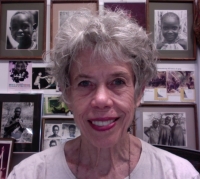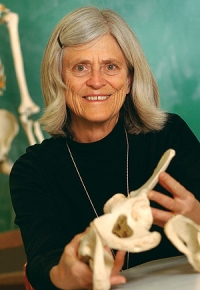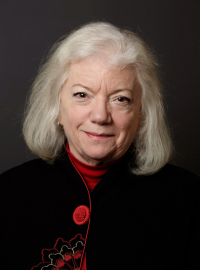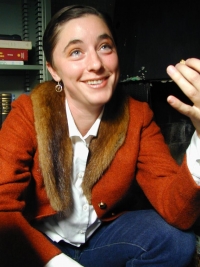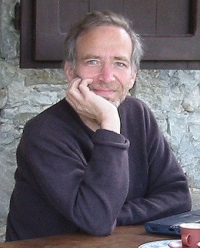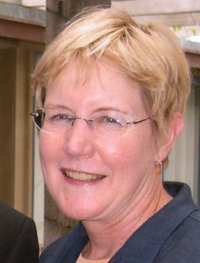Birth to Grandmotherhood: Childrearing in Human Evolution
Biographical Sketches: Co-Chairs
University of Utah
Kristen Hawkes is Distinguished Professor of Anthropology at the University of Utah. Her principle interests are the evolutionary ecology of hunter-gatherers and human evolution. She studies age and sex differences in behavior, using comparisons between people and other primates, paleoanthropology and evolutionary modeling to develop and test hypotheses about the evolution of human life histories and social behavior. Hawkes has pursued ethnographic fieldwork in highland New Guinea, Amazonia, and eastern and southern Africa. She is a member of the Scientific Executive Committee of the Leakey Foundation, the American Academy of Arts and Sciences, and the National Academy of Sciences.
School for Advanced Research, Santa Fe, New Mexico
Wenda Trevathan is Regents Professor (emerita) of Anthropology at New Mexico State University and a biological anthropologist who earned her PhD at the University of Colorado, Boulder. Her research focuses on the evolutionary and biocultural factors underlying human reproduction including childbirth, maternal behavior, sexuality, and menopause. Her primary publications include works on the evolution of childbirth and evolutionary medicine. She is a co-editor of two collections of works on evolutionary medicine (Oxford University Press, 1999 and 2008) and published the book Ancient Bodies, Modern Lives: How Evolution Has Shaped Women’s Health (Oxford University Press) in 2010. She currently serves as a Senior Scholar at the School for Advanced Research in Santa Fe, New Mexico, where she is writing a book on infancy in evolutionary perspective with Karen Rosenberg.
Biographical Sketches: Speakers
University of Portsmouth
Kim A. Bard is a professor of comparative developmental psychology, past-president of the Primate Society of Great Britain, and president of the European Federation for Primatology. Prior to joining the Psychology Department at Portsmouth in 1999, she was research scientist at Yerkes National Primate Research Center of Emory University, where she designed a responsive care nursery for infant chimpanzees to optimize their coping and communicative skills. Bard's research concerns understanding the process of development in evolution. She conducts empirical studies with an eye to clarifying universal and species-specific characteristics of humans and great apes, leading to better understanding of the precursors, contexts, and sequelae of social cognition in human development. She received her MA and PhD in comparative/developmental psychology from Georgia State University, and her BA with Honors in psychology from Wheaton College, MA. She currently serves on the Advisory Board of Primates, on the Council of the International Primatology Society, and was associate editor of the British Journal of Psychology, 2007-2012. Bard has over 80 peer-reviewed publications and 37 book chapters.
Indiana University; Department of Psychology, University of Virginia
Sue Carter, Ph.D. is currently a Distinguished Research Scientist and Rudy Professor Emerita of Biology at Indiana University and Professor of Psychology at the University of Virginia. She has held Professorships at the University of Illinois at Chicago, the University of Maryland, College Park (where she was a Distinguished University Professor), and the University of Illinois, Urbana-Champaign. Between 2014 and 2019 she was the Executive Director of the Kinsey Institute.
Dr. Carter’s research was integral to discovering the relationship between social behavior and oxytocin. Her current work in humans and other mammals examines the developmental and epigenetic consequences of oxytocin and the role of oxytocin pathways in selective sociality and the management of social isolation, stress and trauma. She was the first person to detect and define the endocrinology of social bonds through her research on the socially monogamous, prairie vole. These findings helped lay the foundation for ongoing studies of behavioral and developmental effects of oxytocin and vasopressin and a deeper appreciation for the biological importance of relationships and sociostasis in human health and wellbeing.
Washington State University, Vancouver
Barry Hewlett is a professor of anthropology at Washington State University, Vancouver. He received his PhD from the University of California, Santa Barbara in 1987 and has had appointments at Tulane University, Kyoto University, Hawassa University, Southern Oregon University, and Oregon State University. Hewlett has conducted research with Congo Basin hunter-gatherers since 1973 and is author of Intimate Fathers: The Nature and Context of Aka Pygmy Paternal Infant Care (University of Michigan Press, 1993); Hunter-Gatherer Childhoods (Aldine Transaction, 2005), edited with Michael Lamb; Ebola, Culture and Politics: The Anthropology of an Emerging Disease (Cengage Learning, 2007), with Bonnie Hewlett; Father-Child Relations: Cultural and Biosocial Contexts (Transaction Publishers, 1992); and, Hunter-Gatherers of the Congo Basin: Cultures, Histories and Biology of African Pygmies (Transaction Publishers, 2014).
Arizona State University
Katie Hinde is an Associate Professor in the School of Human Evolution and Social Change, Center for Evolution and Medicine, at Arizona State University. As Director of the Comparative Lactation Lab, she investigates the adaptively relevant environment of the developing mammalian infant- the mother and her milk- to understand early life metabolic, immunological, and biobehavioral organization. She has established descriptive and explanatory mechanisms of milk synthesis in the rhesus macaque, the primary non-human biomedical model, and demonstrated how maternal life history, infant sex, and cultural ecology influence milk. She earned a B.A. in anthropology from the University of Washington in 1999 and a Ph.D. in Anthropology from UCLA in 2008. From 2009-2011, she trained as a post-doc in neuroscience at the California National Primate Research Center, UC Davis and began her faculty career as an Assistant Professor in Human Evolutionary Biology, Harvard University 2011-2015. In addition to her scholarly publications, Hinde co-edited “Building Babies: Primate Developmental Trajectories in Proximate and Ultimate Perspective” released by Springer in 2013, is an associate editor and writer for SPLASH! Milk Science Update, and serves on the executive council for the International Society for Research in Human Milk and Lactation. She showcases research on mother’s milk, breastfeeding, and lactation for the general public, clinicians, and researchers at her blog “Mammals Suck… Milk!”
Professor Emerita, University of California, Davis
Sarah B. Hrdy is Professor Emerita at the University of California, Davis. A former Guggenheim fellow, she has been elected to the National Academy of Sciences, the American Academy of Arts and Sciences, the California Academy of Sciences, the American Philosophical Society and the American Association for the Advancement of Science. She is the author of six books including The Black-man of Zinacantan: A Central American Legend (University of Texas Press, 1972); The Langurs of Abu: Female and Male Strategies of Reproduction (Harvard University Press, 1977) the first book to examine the reproductive strategies of nonhuman primates from the perspective of both sexes; The Woman that Never Evolved (Harvard University Press, 1981, new edition 1999) selected by the New York Times as one of the Notable Books of the Year; and Mother Nature: A History of Mothers, Infants and Natural Selection (Pantheon, 1999), which won the Howells Prize for Outstanding Contribution to Biological Anthropology and was chosen by both Publisher’s Weekly and Library Journal as one of the “Best Books of 1999", Mothers and Others (Belknap Press of Harvard, 2009), a book about the role of alloparental care and provisioning of young (cooperative breeding) in the emergence of "emotionally modern" humans which was awarded both the Howells Prize and the Staley Prize, and Father Time (Princeton University Press, 2024). She is also co-editor of Infanticide: Comparative and Evolutionary Perspectives (Taylor and Francis Group, 1984), selected by Choice as one of the "Outstanding Academic Books" for 1984, and co-editor with Sue Carter and others of Attachment and Bonding: A new Synthesis (The MIT Press, 2005). Hrdy edited the Foundations of Human Behavior series from 1985-96 and continues to serve on editorial boards for Evolutionary Anthropology and Human Nature. She lives with her husband Dan, a retired medical professor and currently a walnut grower, on their farm in northern California.
University of New Mexico
Hillard Kaplan is a professor of anthropology at the University of New Mexico. Kaplan’s research examines the evolution of the human life course. This work has at various times focused on food sharing, fertility decisions, parental investment, sex roles, subsistence behavior, intelligence, and life span. His empirical work draws on fieldwork with a number of populations including the Ache (Paraguay), Piro (Peru), Yora/Yaminahua (Peru), Machiguenga (Peru), Tsimane (Bolivia) and Xhosa (South Africa). Kaplan’s past work on fertility and parental investment has also drawn on a data collected from men living in Albuquerque, New Mexico. He currently directs the Tsimane Health and Life History Project with Michael Gurven (UC Santa Barbara).
Emory University
Melvin Konner is the Samuel Candler Dobbs Professor of Anthropology at Emory University. His PhD and MD are from Harvard. He did fieldwork for two years among !Kung San (Bushman) hunter-gatherers. His ten books include The Tangled Wing: Biological Constraints on the Human Spirit (Holt Paperbacks, 2003); Why the Reckless Survive and Other Secrets of Human Nature (Viking Adult, 1990); and The Evolution of Childhood: Relationships, Emotion, Mind (Belknap Press, 2011). He is a Fellow of the American Association for the Advancement of Science and has written for Science, The New England Journal of Medicine, Nature, The New York Review of Books, The New York Times, Newsweek, and other publications.
Selected articles and book chapters include:
- Konner and C. Worthman, "Nursing frequency, gonadal function and birth spacing among !Kung hunter-gatherers," Science 207:788-90, 1980
- Eaton, S.B. and Konner. "Paleolithic nutrition," New Engl. J. Med. 312:283, 1985
- Brown, P. and Konner. "An anthropological perspective on obesity," Ann. N.Y. Acad. Sci. 499:29, 1987
- Worthman, C.M. and Konner. "Testosterone levels change with subsistence hunting in !Kung San men," Psychoneuroendocrinol. 12(6):449, 1987
- Barr, R.G., Konner, M., Bakeman, R., and Adamson, L. "Crying in !Kung San infants," Devel. Med. Child Neurol. 33:601, 1991
- "Universals of behavioral development in relation to brain myelination," in K. Gibson and A. Petersen (eds.), Brain Maturation and Cognitive Development, 1991
- Eaton, S.B. and eight others. "Women's cancers in evolutionary perspective," Quart. Rev. Biol., September, 1994
- "Anthropology and psychiatry," in Kaplan, HI and Sadock, BJ (eds.) Comprehensive Textbook of Psychiatry, Williams & Wilkins, 1995
- "Darwin's Truth, Jefferson's Vision: Sociobiology and the Politics of Human Nature," The American Prospect 45: 30-38, 1999
- “Human Nature: Seeking Universals,” invited essay, Nature 415:121, January 10, 2002
- “Bridging Our Differences,” Newsweek, June 16, 2003, invited essay on how men and women process emotion
- “Hunter-Gatherer Childhood: The !Kung and Others,” in B. S. Hewlett and M. E. Lamb, eds., Hunter-Gatherer Childhood, Cambridge University Press, 2005
- “Attachment,” invited essay, Nature 429:705, June 17, 2004
- “Trauma, Resilience, and Adaptation,” in L. J. Kirmayer, R. Lemelson, and M. Barad, eds., Understanding Trauma, Cambridge University Press, 2007
- “Evolutionary Foundations of Cultural Psychology,” in S. Kitayama and D. Cohen, eds., Handbook of Cultural Psychology (New York, The Guilford Press, 2007)
- A. C. Kruger and Konner, “Who Responds to Crying? Maternal and Allocare among the !Kung,” Human Nature 21(3):309-329, 2010
- Konner and S. B. Eaton, “Paleolithic Nutrition: Twenty-Five Years Later,” Nutrition in Clinical Practice 25(6):594-602, 2010.
UC San Diego
Margaret Schoeninger is Distinguished Professor Emerita of Anthropology at UC San Diego, a Research Archaeologist in the Glenn Black Laboratory of Archaeology at Indiana University, and Emerita Co-Director of CARTA. She has done fieldwork in North America, Mexico, Pakistan, India, Kenya, and Tanzania as well as laboratory research on carbon, nitrogen, and oxygen stable isotope ratio analysis in biological tissues and food component analysis of traditional foods. Her major interest is in the evolution of human diet particularly as it informs our understanding of the appearance and evolution of the human lineage.
